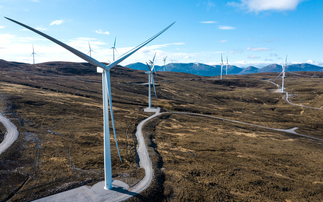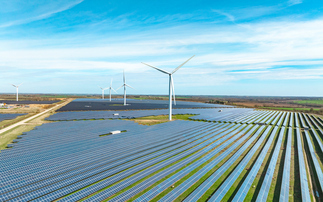But campaigners warn new strategy does not move fast enough to end financing for fossil fuel infrastructure
Barclays has this week provided a major update to its new net zero investment strategy, strengthening a number of its decarbonisation targets and unveiling a new dashboard to track its progress.
In a letter to shareholders published yesterday, Barclays group chairman Nigel Higgins said that in the six months since it announced an ambition to deliver net zero emissions by 2050 and align all financing activities with the goals of the Paris Agreement the bank had made significant progress in enhancing its strategy.
"The journey is far from complete - and the challenges in the current pandemic have not made it easy to progress the work beyond what we indicated in March - but we have made progress and are committed to continuous improvement in our response to the climate challenge," Higgins said.
Specifically, he announced the launch of a new climate dashboard - dubbed BlueTrack - which aims to track progress against Barclays decarbonisation targets for its portfolio.
The dashboard and the methodology behind it will made available online together with its data sources and Higgins stressed that the company was "committed to further enhancement and refinement of our methodology, including data capture, over time".
He also explained that the company would use a mix of emissions intensity and absolute emissions measures in tracking its progress towards a fully net zero emission portfolio.
"The most appropriate choice depends on the nature of the portfolio being measured, and how far its carbon intensity has already reduced," he argued. "Generally speaking, we believe that most portfolios will be best measured primarily using an intensity measure - emissions per unit of output - at least in the earlier stages of decarbonisation. As the linked emissions of a portfolio reduce, we will also start to track an absolute measure, which will of course lead towards net zero."
Barclays also today confirmed that it is on track to reduce the carbon intensity of its power portfolio by 30 per cent by 2025 and as such will now target a 15 per cent reduction in absolute emissions by 2025, rather than in CO2 intensity.
"This reflects the fact that the energy sector cannot so easily reduce its emissions intensity (you cannot de-carbonise a barrel of oil), and our energy portfolio has already reduced in intensity, such that only two per cent of the fuel mix is now represented by coal," Higgins explained.
He also confirmed the company would continue to work to introduce new emissions targets for other industries, including in some industrial and manufacturing sub-sectors which are set to be announced in the next year.
"The totality of this work should enable us to set a decreasing 'carbon limit' for emissions linked to financing we provide to clients across every sector," Higgins said. "Our climate dashboard will be refreshed and expanded in line with our annual ESG reporting. We would like to see greater adoption of common measures across the industry, and will continue to work closely with our peers and industry groups to achieve that."
In addition, the bank revealed that it has reorganised its sectoral banking teams, upped its commitment to the expanding green finance sector in support of the company's £100bn green investment goal, appointed a group head of climate risk, and made climate action a key responsibility of a new role on Barclays' Executive Committee with the appointment of Sasha Wiggins as group head of public policy and corporate responsibility.
Barclays also confirmed it is continuing to engage with a number of industry-wide initiatives, including the Two Degrees Investing Initiative's Paris Agreement Capital Transition Assessment (PACTA), the Partnership for Carbon Accounting Financials (PCAF), and the Financing a Just Transition Alliance.
The update drew a mixed response from environmental campaign groups. In a statement, ShareAction said it was "pleased to see Barclays reaffirm its plans to be a net zero bank by 2050 and take responsibility for its financed emissions by joining PCAF".
"We also welcome the publishing of a transparent methodology that covers Barclays' capital markets activities," it added. "However, banks, as the lifeblood of the economy, need to take a precautionary approach to tackling the climate crisis. This must entail phasing out support for companies that are clearly out of step with the Paris climate goals, especially coal and oil sands companies. Barclays' energy policy fails to screen out companies with significant exposure to both of these sectors and presents a glaring hole in the company's climate ambition."
The group said "Barclays should also start using a climate scenario that matches its ambition", noting that its plans were based on the IEA's Sustainable Development Scenario, which details a global energy transition that would not reach net zero emissions until 20 years after Barclays' target date.
Market Forces UK Energy Finance Campaigner Adam McGibbon offered a similarly blunt assessment. "This announcement does nothing to put Barclays on a path that would actually meet its net zero emissions by 2050 target," he said. "We'll simply get a much clearer picture of how they're investing in climate catastrophe - something NGOs have been demonstrating for years."









